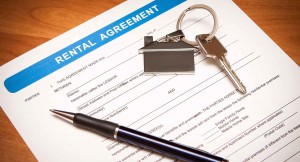When a tenant signs a rental agreement, they are ultimately agreeing to the ‘house rules’.
But, what happens when they break the ‘house rules’ and how does it impact your insurance?
It is a situation no agent or landlord wants to deal with, but it is something many do face.
If a tenant breaches their tenancy agreement, responding in a quick and appropriate manner can save you time, stress and even money.
But first, what exactly is a breach?... 
A breach is when a tenant disobeys the rules set out in the lease.
This could include damaging the property, being a nuisance to neighbours, or a common breach is rent default.
When a tenant falls behind in rental payments, it is important landlords and property managers act quickly.
This is not only to ensure the issue is resolved ASAP (and to remove the associated emotional stress), but a quick response can also have a big impact on your landlord insurance.
We know it can be complicated and confusing, so we have answered common questions about how to respond to a breach when your tenant fails to pay rent on time…
HELP! My tenants are behind in rent – what should I do?
As soon as a tenant is behind in rent, a breach notice should be issued immediately to prevent further loss.
NOTE: a breach notice cannot be issued until the tenant is a certain number of days behind in payments.
This number varies depending on the location of the property.
So, when can I issue a breach notice for rent default?
This is when you can issue a breach notice in your state:
- Queensland
If your tenant falls more than seven days behind in rent, you can issue a notice to remedy breach (form 11), giving them seven days to catch up in payments.
- Western Australia
If your tenant falls more than one day behind in rent, you can issue a breach notice for non-payment of rent (form 21), giving them 14 days to catch up in payments.
- Victoria and New South Wales
In VIC and NSW, there is no formal breach notice for rent default. However, you can (and should) notify the tenant on the first day of the arrears, giving them 14 days to catch up in payments.
- South Australia
If your tenant falls more than 14 days behind in rent, you can issue a notice to tenant to remedy breach of agreement (form 2), giving them seven days to catch up in payments.
- Northern Territory
If your tenant falls more than 14 days behind in rent, you can issue a notice to remedy unpaid rent (form RT03), giving them seven days to catch up in payments.
- Australian Capital Territory
If your tenant falls more than seven days behind in rent, you can issue a notice to remedy breach, giving them 14 days to catch up in payments.
What should I include on a breach notice?
Breach notices are different in each state, however they all pretty much notify the tenant they have done something wrong and ask for the situation to be fixed within a certain number of days.
In order to be valid, there are a number of things a breach notice should include, which again may differ from state to state.
But typically, a breach notice should highlight:
- Specifics around how the tenant has breached their lease agreement and/or the Residential Tenancies Act.
- Information about the loss or damage caused by the breach.
- Details outlining what is required to be fixed or what compensation needs to be paid.
- The consequences if the tenant does not respond accordingly.
- The date (to show the day the breach notice was issued) and a signature.
If the notice is not served properly, it will not look good for you if the matter goes to a court or tribunal HOT TIP: tribunals have been known to completely reject a landlord’s claim in court simply because the notice wasn’t served correctly.
What happens if the tenant catches up on rent?
That is great news!
Apart from making sure you have a thorough record of the breach, including the dates you issued the first breach notice and the date they responded, you don’t need to do anything else.
But, if it happens again, the same process should be followed.
What if they don’t?
If the breach is not resolved, the landlord and property manager may be able to issue an termination notice and end the lease agreement.
How does this whole situation impact landlord insurance?
Landlord insurance is a great safety net when something goes wrong.
However, in order to make sure your insurance is valid, and you are able to maximise your return when it comes to making a claim, landlords and property managers need to make sure they are following the right processes.
This means, as soon as your tenant breaks the rules, a breach notice should be issued to ensure you are on top of the situation.
For example –
- These are the steps you should take in Western Australia when your tenant is one day behind in rent…
Step one: Promptly issue a breach notice on day one of arrears, giving the tenant the required 14 days to catch up on payments.
Step two: If the tenant catches up on payments, great!
No more steps are needed.
If not, and the tenant refuses to pay the outstanding cash within the timeframe, you can issue a notice of termination, requiring the tenant to vacate the home within seven days. - If you are a client of EBM RentCover, this is how our insurance would help…

EBM RentCover would typically cover the period from the day after the rent was paid up to, to the day the tenant vacates the property + if you have a fixed-term lease, we would cover the time it takes to secure a new tenant (up to six weeks).
If however, the tenant refuses to leave the property within the timeframe outlined in the termination notice, the landlord/property manager may be required to apply to the courts for possession of the rental.
This would then typically be covered under denial of access, which offers up to 52 weeks cover when a tenant refuses to leave a property. - This is what you shouldn’t do…
Do not wait until it is too late.
While it seems odd to delay issuing a breach notice, it is common in a downturned property market where rents are decreasing.
This is because landlords oftentimes fear they will lose their tenant and get less rental income.
However, reality is, the tenant is likely to continue to default on rent and the landlord will be out of pocket further as the insurance cover for arrears is typically capped at a certain number of weeks.
Sharon Fox-Slater is the Managing Director of EBM RentCover and was part of the core team that helped launch one of Australia’s first landlord insurance policies into the market.
















